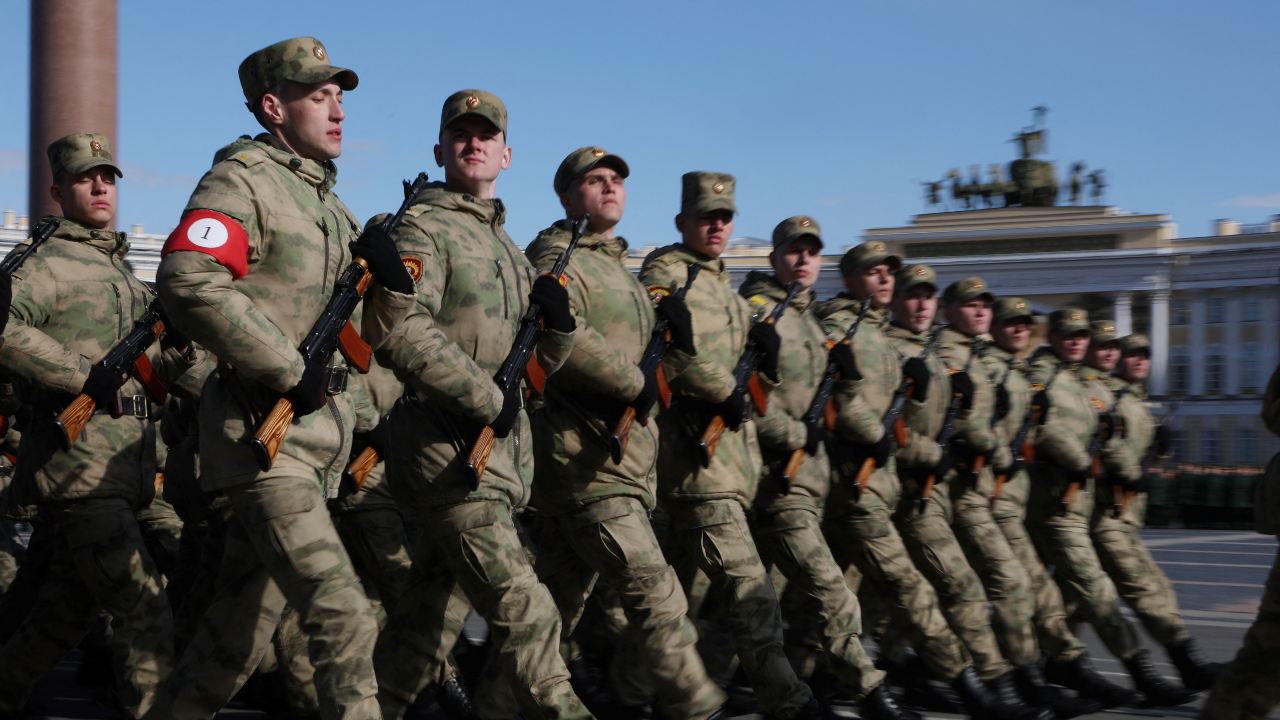Putin and the logic of eternal war

Vladimir Putin says he is ready to end the war he started. But his conditions are not acceptable to Ukraine or to radical Russian nationalists. Independent analysts warn that his “peace formula” could in reality only lead to escalation.
Putin’s statement came on June 14, on the eve of the Ukrainian peace summit in Switzerland. In order to begin peace talks, Ukraine must withdraw its troops from the Donetsk, Luhansk, Zaporizhia and Kherson regions, he said. He said Kyiv must abandon plans to join NATO and agree to a “neutral, non-aligned and nuclear-free status” and guarantee the rights of the Russian-speaking population. It must “demilitarize” and “accept the new territorial realities,” he added. The plan requires the West to lift all sanctions against Russia.
Independent media have pointed out that Putin has repeatedly mentioned the resumption of peace talks in recent weeks and stressed that Russia is open to talks. This could reflect both the West’s delayed release of some $166 billion in aid to Ukraine, organized by the US, European Union and G7. It could also be an expression of war weariness in Russia, where polls suggest only about one in five Russians can be considered radically pro-war.
But as always with Putin, it is advisable to decouple his public statements from reality. By setting unacceptable preconditions, the Russian president is effectively signaling that he will continue the war and refuse to make any concessions. Political scientist and publicist Vladimir Pastukhov suspects that this could actually lead to an escalation of the confrontation between the Kremlin and the West, for example through a sharp increase in acts of sabotage and hacker attacks in Europe.
The reaction of radical nationalists close to the Kremlin to Putin’s peace talk suggests that they do not believe that negotiations are imminent. The president’s words were “absolutely the right step,” said Konstantin Malofeyev, the “Orthodox oligarch” and founder of the Tsargrad television channel. He openly expressed the hope that the West would reject Putin’s conditions (which it did) and thus allow the war to continue. Malofeyev’s associates shared this view.
But some even more extreme ultra-radicals, allies of the imprisoned former FSB officer Igor Girkin (Strelkov), have openly opposed the proposal. They believe that Putin’s demands would actually serve the interests of the US and China. According to Strelkov-Girkin ally Maksim Kalashnikov, if Putin’s conditions are accepted, “Ukraine’s anti-Russian statehood would be preserved on 80 percent of its territory.”
Moreover, Kalashnikov said, “the NATO bloc has been replenished by Swedes and Finns,” and the Russian economy will inevitably weaken after the reduction in military orders, making Moscow even more dependent on Beijing. At the same time, Kalashnikov acknowledged that the standard of living in the free areas of Ukraine will be higher than in the Russian-occupied territories (a modern echo of the glaring wealth gap between West Germany and the Russian-occupied GDR).
These extremists argue that the war can only be ended by destroying Ukraine as an independent state. That is, they completely reject Putin’s “peaceful” offers. This raises the question of whether Putin could end the war even if he wanted to.
Russian opposition leader Mikhail Khodorkovsky has repeatedly stated that Putin cannot agree to peace because he is dependent on the so-called national patriots. For this reason, their influence is even increasing.
Get the latest
Sign up to receive regular emails and stay updated on CEPA’s work.
One example is the proliferation of “academic” clubs, nationalist-conservative student associations that are rapidly growing at universities across the country. The project is sponsored by Malofeev and promotes “philosophical conversations.” In addition to war-glorifying lectures, students learn to fly drones, weave camouflage nets, make trench candles, and denounce opponents of the war, from well-known artists to their own teachers.
According to Vera Alperovich, an analyst at the Sova Research Center, the development of such projects promotes the rise of violence because it is based on a right-wing extremist xenophobic ideology. “This ideology is basically built in such a way that its supporters always persecute some part of society,” wrote the human rights activist.
This is not the first time that the Kremlin has created youth organizations to persecute the opposition and minorities. Previously, this function was assigned to the pro-Kremlin movement Nashi, founded in 2005. But over time, the movement failed to live up to expectations and instead became a springboard for young careerists.
The next attempt to turn young people against dissidents was the creation of organizations of supporters of the “new ideologists,” such as the communist Sergei Kurginyan. The “Essence of Time” movement, which formed around his ideas, was left-wing, but fulfilled the same function of combating the opposition.
Kurginyan’s supporters organized rallies against the Orange Revolution in Ukraine in 2012 and supported the war in Donbass together with conservatives. Most of the Essence of Time participants believed they were members of an opposition patriotic organization, while in reality they were completely controlled by the Kremlin.
Given the dark history of the Putin regime and its increasingly repressive approach, there is a high probability that the presidential administration will once again take control of the main nationalist associations.
They become tools of a system whose goal is to preserve one man’s power. Putin himself, it seems, believes more strongly in radical ideologies and in the “historical mission” he believes derives from them.
The 71-year-old can probably offer nothing more than ultimatums, because he cannot and does not want to go back on his decision of February 24, 2022 and before. The Kremlin and the radical nationalists are moving ever closer together.
Kseniya Kirillova is an analyst focusing on Russian society, mentality, propaganda and foreign policy. She has written numerous articles for CEPA and the Jamestown Foundation and has also written for the Atlantic Council, Stratfor and others.
Europe’s edge is CEPA’s online journal covering major foreign policy issues in Europe and North America. All opinions are those of the author and do not necessarily reflect the position or views of the institutions he represents or of the Center for European Policy Analysis.

Europe’s edge
CEPA’s online journal covers important foreign policy issues in Europe and North America.
Read more



